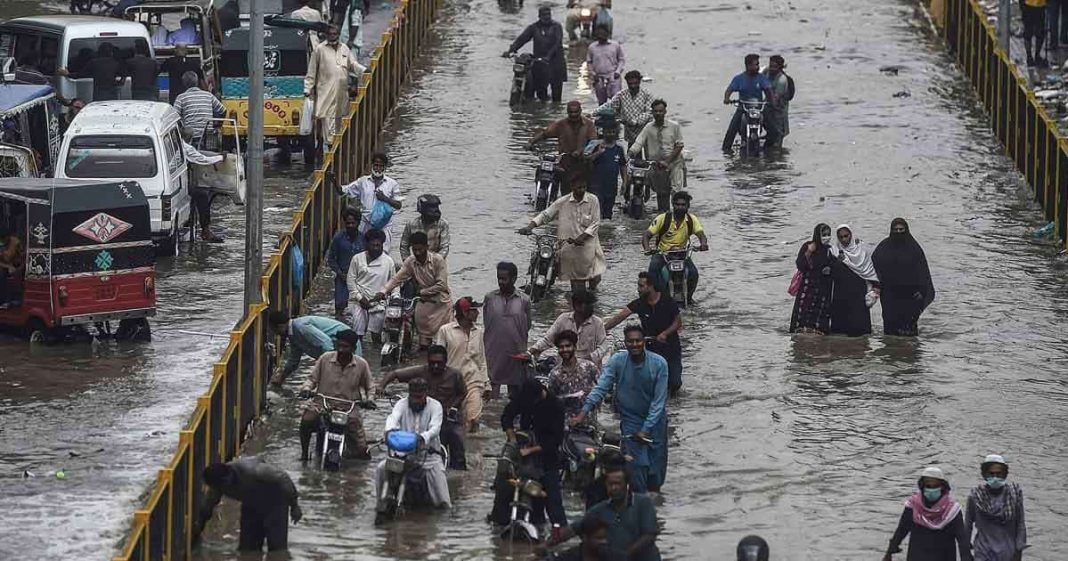Karachi is the economic backbone of Pakistan; the large metropolitan city contributes 25 percent to the national Gross Domestic Product (GDP) and 65 percent to federal government revenues. It also accounts for 95 percent of Sindh’s Gross Domestic Product and 90 percent of its revenues. Yet, the city suffers from massive bad governance and the lack of political will to deliver essential services for its population.
The 2017 Population census-estimated Karachi’s population around 14 million, but this number is politically contentious, with many locals estimating a number closer to 22 million. It has a huge uncontrolled population growth that, accompanied by poor planning, has meant infrastructure – water supply, sewerage, electricity, gas, communications – is proving insufficient to cope with its growing population needs.
Last year’s havoc caused by the Monsoon torrential rains served to remind us about the threat posed by climate change and the immediate need to revamp all encroached stormwater drains of Karachi. In August 2020, Karachi received its heaviest rainfall that season in decades.
The rain claimed more than 30 lives, and the city’s electricity supply and cellular services were disrupted for days on end. In this environment, the Karachi transformation plan finally assumed priority on the federal government’s agenda. The government of Pakistan came up with a comprehensive plan in December 2020 known as the Karachi Transformation Plan.
It includes a range of projects addressing water supply, sewerage treatment, solid waste management, restoration of the drainage system, mass transit rail, and road transport, over 100 different projects in total. The government has allocated Rs 1.1 trillion for the Karachi Transformation Plan that was announced would be executed over three years.
Once completed, it will significantly improve the living conditions of the residents in the city. To curb the immediate threat of urban flooding, the Government of Pakistan, through National Disaster Management Authority (NDMA), tasked the Frontier Works Organization to undertake rehabilitation of Gujjar and Mehmoodabad stormwater drains in Karachi on an urgent basis. FWO enjoys an excellent reputation for executing national projects in challenging environments.
The Organization has also joined hands with the Government of Sindh and the Planning Commission in planning various Karachi Transformation Plan projects.
Read More: FWO to be awarded Sialkot-Kharian Motorway contract
Karachi Transformation Plan:
It is a comprehensive plan to undertake high-impact projects for Karachi with all stakeholders on board. A 10-member Provincial Coordination and Implementation Committee (PCIC) was set up with Sindh Chief Minister Syed Murad Ali Shah.
Other committee members include a representative of the Pakistan Army’s V Corps, Commissioner Karachi, Administrator Karachi, National Disaster Management Authority, a representative of the federal government, Secretary Local Government, and Secretary Transport & Mass Transit, Chairperson Sindh Planning, and Development Board, and Chief Secretary Sindh.
Currently, projects in each category have been identified along with their financial requirements, possible funding sources, completion period, etc. Short-term and high-impact projects have been accorded higher priority, and a lead agency for each prioritized project has been identified, and a proposed financing plan has been given.
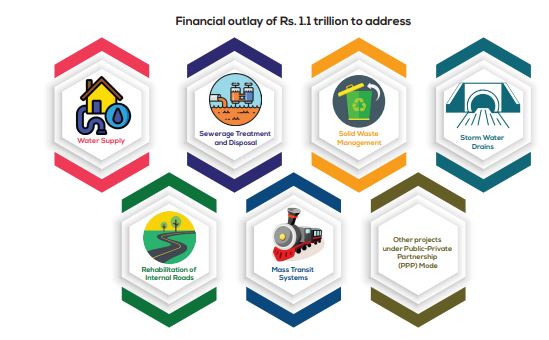
Urgency of solving Karachi’s Drainage System:
Karachi’s water problems are a non-ending issue that city managers have not addressed; the subject is further complicated because different authorities manage them. The natural drainage system of Karachi comprises a large number of minor & major stormwater drains. These carry water to rivers (Lyari & Malir) and thereon into the sea.
About 500 km2 of Karachi drainage system depends on Malir and Lyari rivers. The Malir river system consists of two major stormwater drains, the Chakora Nullah and Thado Dam, while the Lyari river system comprises the Gujjar and Orangi storm water drains.
Read More: PTI govt to build 6 lane bridge over Karachi waters
Importance of Revamping Storm Water Drains:
Major issues necessitate the revamping of drains as encroachers have illegally grabbed government land and built on stormwater drains, effectively reducing the width of these drains. Furthermore, introducing illegal human settlements in these areas has introduced issues of continuous disposal of solid waste, which has choked these stormwater drains.
Reduced width and choking have drastically reduced the discharge carrying capacity of these stormwater drains and rendered them unsuitable for managing Monsoon rainwater safely. The heavy monsoon rains of 2021 and subsequent urban flooding highlighted the urgency of revamping the old drainage systems of Karachi. On the instructions of the Prime Minister of Pakistan, NDMA decided to commence revamping of major drains on priority.
The restoration of the drainage system of Karachi was planned in two phases: In phase 1, the aim was to clear, realign and develop both Lyari & Malir rivers and three major drains (Mehmoodabad, Gujjar & Orangi) after removing encroachments. The aim was to ensure that when the Monsoon rains hit again in 2021, the process allows easy clearance of stormwater. In phase 2, further encroachments will be removed from other drains, and drains will be revamped in line with recommendations by the NED University in Karachi.
Being a leading engineering university in Karachi, NED was tasked to conduct a survey and give a conceptual plan/design along with anti-encroachment measures to revamp the three main stormwater drains.
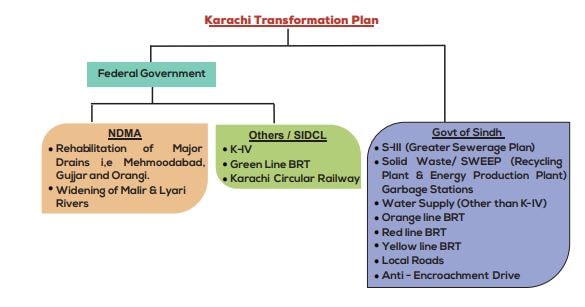
FWO’s Role in Urban Flood Mitigation:
While it plays a vital role in other projects of KTP (KIV & Karachi Circular Railway), FWO was given the challenging task of revamping on an urgent timeline both Gujjar & Mehmoodabad drains. Both drains had not been dredged for decades due to the non-availability of working space on their banks due to encroachments. This caused the water carrying capacity of drains to reduce drastically.
Furthermore, the disposal of solid waste in these drains by people choked them at multiple locations, causing overflows and inundation of surrounding areas during the rainy season. Work started on Mehmoodabad Drain in January 2021, while mobilization on Gujjar Drain started March 2021.
Read More: Zameen.com offers exciting investment deals at Karachi’s property sales event
The overall plan was to dedicate these drains only for stormwater through dredging and widening of drains using Reinforced Cement Concrete (RCC) retaining walls on both sides and to segregate sewerage water by laying sewerage trunks outside RCC retaining wall on both sides of the drains.
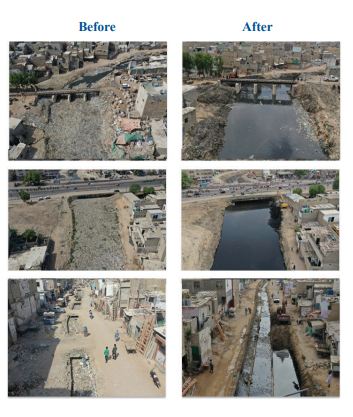
Currently, the latter forms the predominant flow of these erstwhile drains. While Mehmoodabad Drain work is nearing completion and the whole project expected to be completed by end of November, work on Gujjar Drain is still in process. About 80 percent of dredging and widening activity has been completed and all the choke points are cleared to ensure smooth stormwater drainage as per phase 1 and work has been started on phase 2.
More than 600,000 tons of solid waste has been removed from both drains and dumped at the landfill site in Jam Chakro. drain: A tight timeline was given to FWO to complete work; and substantial work on Mehmoodabad Drain was completed in 6 months, with FWO employees working shifts round the clock, which under normal conditions would have taken around 2 years.
It was no mean feat given the issues it faced, including limited accessibility to the site with very few access routes and, due to the encroachments, minimal working space on the banks of the drains given the heavy machinery/plant equipment that needed to be used in large numbers.
Difficulties were compounded by the fact that people in the highly urbanized neighborhood of Gujjar and Mehmoodabad drains disposed of their waste daily in these drains. Even after clearance of chokepoints, the continuous influx of solid waste causes choking and constant effort has to be made to ensure the drains remain clear of all solid waste.
Read More: FWO leads Federal Govt. initiative to clean Karachi
Over 4500 structures had to be removed in Gujjar drain alone and over 200 machines were employed for this purpose. Due to the haphazard nature of development in the area, the underground utility services were similarly all over the place, not only creating safety issues for those working in the area but also removing them and placing them elsewhere required extensive coordination with respective departments; and when time was of the essence getting everyone on board was not an easy matter.
In addition, given that some people lost their houses during anti-encroachment drives expressed their hostility towards the FWO workers executing these projects.
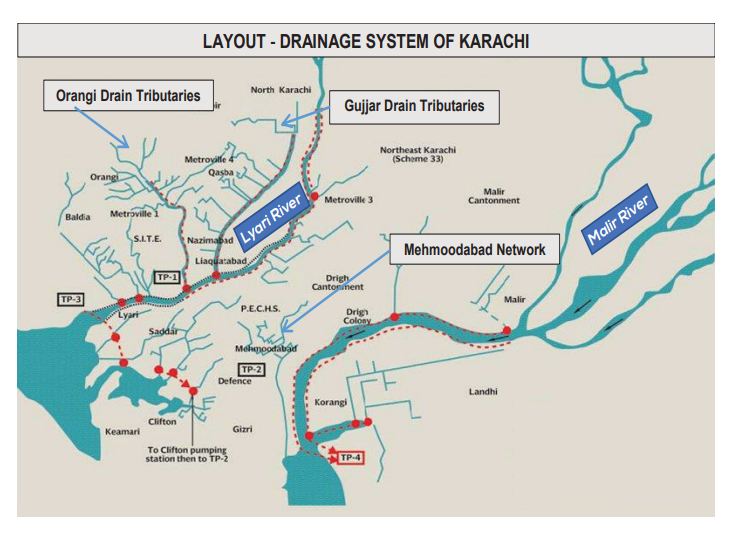
Socio-Economic Benefits:
Revamping both drains will enhance connectivity, boost economic activity, uplift impoverished communities, ensure smooth drainage of stormwater, prevent urban flooding, segregate stormwater from sewerage / industrial waste, which will be treated before being disposed of into the sea.
The project will also replenish the diminishing green cover with green belts and green islands along the drains, thus contributing to the environment’s improvement. Progress in Karachi is essential for a stable Pakistan. It can be achieved through the rule of law, good governance, and sustained development.
Outdated infrastructure, especially services, cannot cope with the population boom that has hit the metropolitan. Climate change has further added to our economic woes. KTP is all-encompassing and can improve Karachi’s fate, provided it is well steered by firm resolve and sustained political will. FWO has emerged as a key contributor to the Plan.


